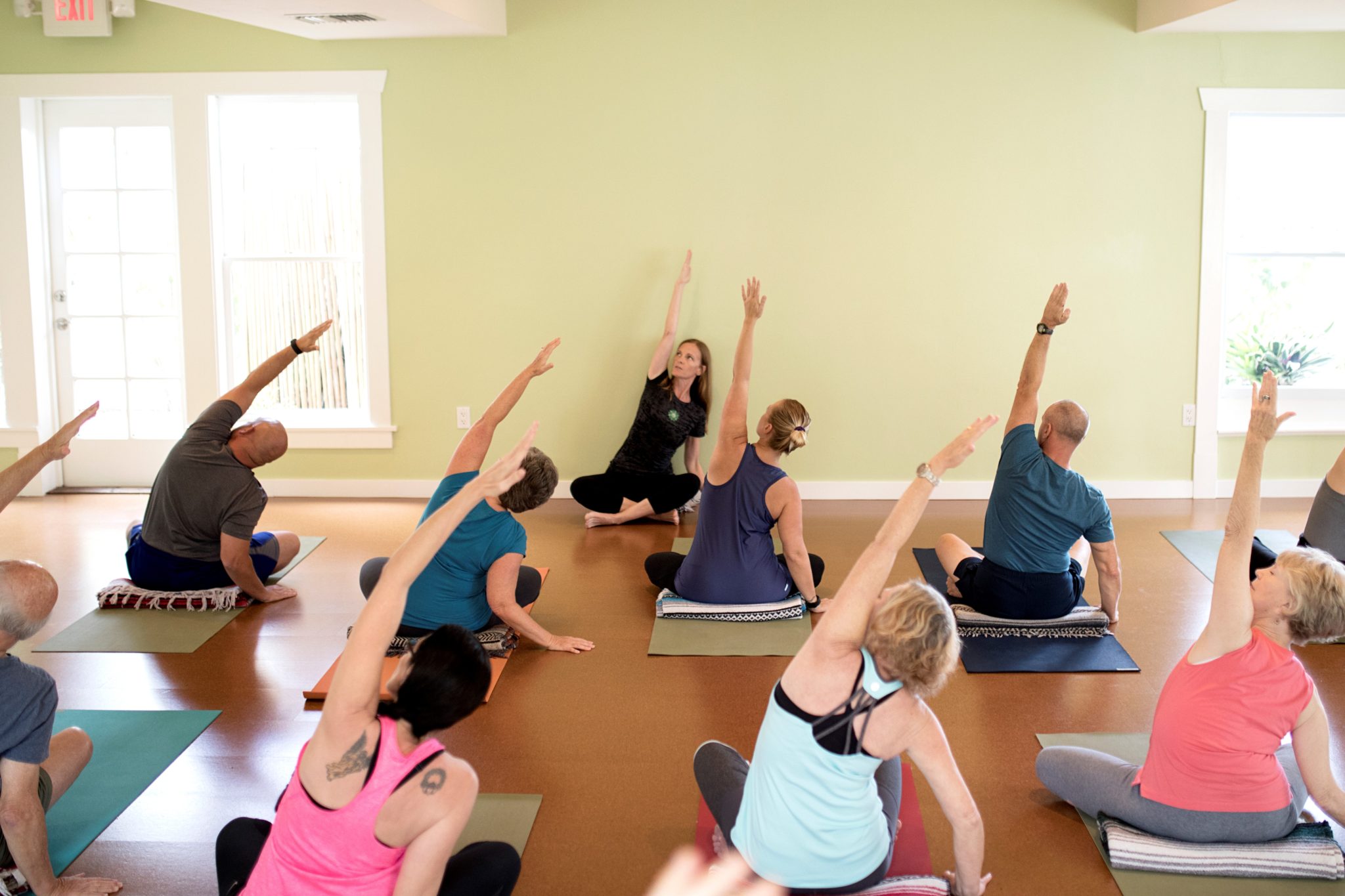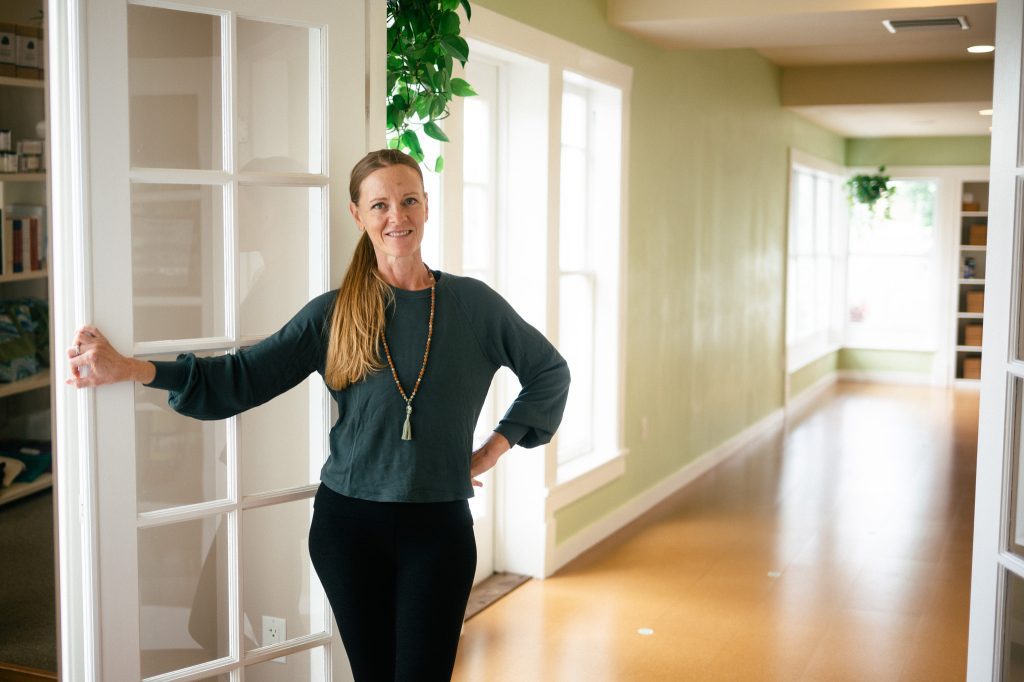
By Jennifer French, E-RYT 500
I remember the first time I seriously considered yoga teacher training. It seems like a lifetime ago. Yet I can easily conjure up the feelings I had, the curiosity, the excitement, the doubt—so much doubt…
When I first started practicing yoga, long before I ever set foot in a yoga studio, or had a “real” yoga teacher, I used books as my guide. Breaking the spines to lay them flat, I’d mimic the shapes on the pages. Those books are what eventually led me to attend an actual yoga studio class and, later, to my first yoga teacher. It could have been then, in those early classes at a Zen Center in Upstate New York, that I first thought at all about teaching yoga. If it was, the idea was filled with “wouldn’t that be cool” and “I could never” and “how does one even do something like that?”
Like many who fall in love with yoga, I continued attending classes, growing in my practice, and becoming more and more curious. Now and again, I noticed that yoga teacher training was a thing. But I didn’t think much more about it—it was for other people: people who were much better at yoga than me, people who knew much more about yoga than me, and people who were confident and comfortable—people who didn’t blink an eye at the idea of being in the front of a full room of yoga students. Those were the people who did yoga teacher training. Not me.
Later, when my boyfriend (now husband) and I moved from Upstate New York down to Southwest Florida, I had to say goodbye to my first yoga-studio home and my first real yoga teacher. At least I had been practicing long enough, so that looking for a new studio, while intimidating, was still something I knew I wanted to do. With only one very small studio in my area, I had to do some further research. Though I didn’t know exactly what it was I wanted in a studio or a teacher, I was looking for something more.
After some trial and error, I discovered a good yoga-studio match—and they were offering a yoga teacher training program—but it was over 50 miles away. I spent hours poring over their website, reading and re-reading about their program. I wondered what it would be like, if it was possible, if I had what it took.
Now, when I look back, I recognize that I still didn’t know anything about being a yoga teacher. And why would I? Yoga was a practice I had grown to love. And I was deeply curious about it. Yoga had helped me in ways I couldn’t explain, and I thought maybe…just maybe…I could help others by sharing the practice with them.
So, I went. One morning, I got in my car and drove those 50-plus miles to take a class and see what the studio was like. I went. And it didn’t happen overnight. I had doubts—so many doubts. “Should I or shouldn’t I apply for the teacher training program?” “Am I good enough, capable enough?” “It’s a long, long drive for such a big commitment.” “Can I financially afford this right now?” etc. But my future husband kept at me, “Quit doubting yourself. Just go for it!” So—eventually—I did.
I now recognize I wasn’t alone. So many aspiring yoga-teachers-in-training share the same worries—whether it’s self-doubt, physical limitations, or the fear of standing in front of a class. In fact, sometime during this first yoga teacher training—and the many trainings that followed—I discovered that yoga offers us the tools to confront these doubts.
One of yoga’s most beloved texts, The Yoga Sutras of Patanjali, teaches that doubt, or samsaya in Sanskrit, is one of the nine obstacles that distract our minds and prevent us from moving forward on our path. Over the years, as both a yoga teacher and mentor, I’ve noticed that doubt is often the most significant obstacle to taking the leap into a yoga teacher training program. It can show up in ways both obvious and subtle…
Self-doubt: I can’t do a yoga teacher training. I’m not good enough at it, that’s for people that are better at yoga than me.
One of the biggest misconceptions yoga students have is that yoga is something you can be good or bad at. We too often compare ourselves to others who seem more advanced, the ones that are “good” at yoga. This just feeds our self-doubt, making us worry that we won’t measure up in yoga-teacher training. This doubt usually comes from focusing on what our bodies can—or can’t do—compared to others. Maybe you think you need to be able to do all the big, fancy poses. You know, the ones where people with thin, flexible bodies balance on their hands with their legs twisted into pretzel shapes!
But the truth is, strong or advanced practice isn’t about the shapes your body can make. It’s about awareness—being in tune with what you’re feeling at any given moment and making changes and adjustments to suit your needs. A strong practice connects you to your breath and cultivates an inwardly flowing awareness. Quality yoga teacher trainings not only explore this idea but emphasize that no posture, or asana, looks the same in every single body. They teach you how to make—and offer—adjustments and variations that meet you (and your potential students) where you are in the moment.
Physical limitations: I can’t do a yoga teacher training. I have a bad hip, I can’t even touch my toes, I’ve never been the same since….
Okay, so you understand that yoga is about much more than just the physical, and you don’t need to do all the fancy stuff. But still… you’ve got that old injury that flares up now and then, or you’re dealing with a replaced hip, or you just can’t touch your toes. It’s important to remember that we all have physical limitations, whether from an injury, a chronic condition, or simply the way we were born—even your current yoga teacher! These limitations can easily make you feel hesitant about joining a yoga teacher training program, especially if you’re worried about keeping up with the physical demands, no matter how passionate you are about yoga.
But this is really just another expression of doubt. The right yoga teacher training will encourage you to explore your limitations in a kind and gentle way, dive deeper into understanding them, and find ways to nurture and support yourself through them. In the end, your limitations can actually be a powerful tool, giving you greater empathy for the students who may one day stand before you.
Have you ever been in a class with something bothering you, and it feels like the teacher created the class just for you. Suddenly, that thing isn’t bothering you anymore? It’s no coincidence—maybe that teacher has faced the same or a similar challenge in their own life…
Inhibition: I can’t do a yoga teacher training. Me?! Stand in front of the room and lead a class?! I don’t know about that…
When I participated in my first yoga teacher training, I had a clear idea that I wanted to teach. But that’s not always the case for everyone. Not everyone who enrolls in a yoga teacher training program wants to become a teacher. Some people are simply looking to deepen their understanding of the practice. Others are unsure. Their ideas about teaching might evolve over the course of the training. Regardless of one’s intentions at the beginning of a program, most people—myself included—find the idea of standing at the front of the room and leading a class very intimidating. And in many teacher training programs, leading a class or teaching in some kind of way is often required. This can be the scariest part of the entire process—bringing all kinds of doubts we have about ourselves to the surface. It can also be the most rewarding. These challenges, and the strength that we develop as we meet them, are an integral part of the journey. I clearly remember my first teaching experience. I thought I’d never make it through the 75-minute class. (My own teacher asked me to sub her class for her!) I stumbled over my words, I struggled to make eye contact, I was unsure of myself… I doubted my knowledge…and I doubted my ability to share it with others. I made it through. I lived to teach another class, and then another, and then another. Eventually, with practice, I started to gain confidence.
But teaching may not at all be part of your initial plan. Perhaps you want to gain a deeper understanding of and connection to yoga. If this is the case, yoga teacher training is still one of the best ways to do so. A quality program will guide you through all aspects of your practice, from the physical layers to the deeper, more subtle layers of breath, mind, and spirit. Regardless of whether you teach or not, you will have taken a journey deep into the heart of your own yoga practice.
Okay, all doubts aside. What next?
Talk to someone. The best person to start with is your current yoga teacher. Not all teachers offer yoga teacher training programs. But all teachers—hopefully—have taken a training program. Most teachers have taken many and continue to do so. If your teacher doesn’t offer a program, ask for their advice. Who might they recommend that you study with?
It’s hard to know what to ask when you have very little experience with something. As the saying goes, you don’t know what you don’t know. But don’t let that stop you—ask questions anyway. If you’re considering a program outside of your current teacher’s studio, be sure to take a class with the teacher you’re thinking of studying with. Make sure there’s a connection. You’ll be spending a lot of time together, so it should feel like a good fit.
When I look back at my first teacher training, I didn’t know what to ask, and as a result, probably didn’t ask much. But now, as a Yoga Teacher Trainer, I have a whole list of questions I’d recommend asking:
- What is the training like overall?
- What does a typical training day look like?
- What will be expected of you?
- What are the program’s strengths and weaknesses, and how might it be different from other programs?
- What informed the development of this particular program or studio’s approach?
- What is their lineage? (And if you don’t understand the answer, that’s okay—ask for clarification!)
- How much time will you need to commit to the program?
- Is there additional work required outside of the classroom hours?
- What is the program’s cost and are there any benefits included in the training’s tuition?
- What are the goals and intentions of the program?
With these questions in hand, you’ll be better equipped to find a program that suits your needs, goals, and intentions. Remember, this journey is uniquely yours. The teacher is simply there to light the way. All you need is a dedication to your practice and an open heart and mind.

Ready to explore more?
✅ Learn about The Yoga Sanctuary’s upcoming 2024/25 Yoga Teacher Training Program HERE.
✅ Join us on Wednesday, October 9th at 6pm for a Free Informational Session to explore our upcoming Yoga Teacher Training Program. Registration opens soons!
✅ Email Jennifer French, E-RYT 500 & Director of The Yoga Sanctuary’s Yoga Teacher Training Program and ask your questions!
